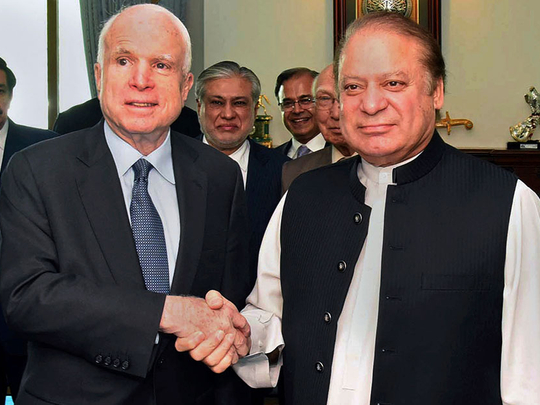
Islamabad: A high-level US Senate delegation met Pakistan’s top foreign affairs official and powerful military chief in Islamabad to discuss regional security as Washington gears up to send more troops to neighbouring Afghanistan.
The visit by members of the influential Senate Armed Services Committee, including top Republican John McCain, came days after Islamabad slammed Washington’s decision to sanction a Kashmiri militant leader.
Prime Minister Nawaz Sharif Monday said as long-standing partners and strategic allies, a sustained and strong Pakistan-US partnership was essential to deal with the various challenges confronting the region and beyond.
The Prime Minister was assisted by Minister for Finance Ishaq Dar, Adviser to Prime Minister on Foreign Affairs Sartaj Aziz, National Security Adviser Lt. Gen. Nasser Khan Janjua and other senior officials.
The Prime Minister apprised the delegation about his Government’s efforts over the last four years to combat terrorism and that its success could be measured by the markedly improved security situation in Pakistan.
He also highlighted the economic turnaround that manifested in enhanced investor interest and confidence in Pakistan.
Prime Minister underscored his government’s commitment to good neighbourly relations and highlighted various initiatives to improve relations with Afghanistan and India.
The relationship between the US and Pakistan has been strained at times with some in Washington believing Islamabad has not done enough to bring its influence to bear to persuade the Afghan Taliban to renounce violence.
McCain described US engagement with Pakistan in the region as “important” in his meeting with Foreign Affairs Adviser Sartaj Aziz, according to a foreign ministry statement.
Aziz for his part vowed Pakistan remained committed to “constructive engagement” with the US in the efforts to create a “stable and prosperous” Afghanistan.
He said Islamabad was ready to deepen its partnership with Washington in the fight against militancy, including against the expanding footprint of Daesh group in the region.
Pakistan Army chief General Qamar Javed Bajwa also called US cooperation a “key factor” in security, as McCain agreed on the importance of coordination between Pakistan and Afghanistan, a military statement said.
Pakistan has received billions in US aid since the invasion of Afghanistan in 2001. Washington is actively considering sending more troops to the war-torn country to help struggling Afghan forces beat back the resurgent Taliban, with American commanders requesting thousands of extra boots on the ground.
The Senate Armed Services Committee has legislative oversight of US military affairs. Other members of the delegation, which arrived Sunday and is due to leave Monday, included Senator Lindsey Graham, Senator Elizabeth Warren, Senator David Perdue and Senator Sheldon Whitehouse.
Last week, the US imposed sanctions on Syed Salahuddin, senior leader of the Kashmiri militant group Hizb-ul-Mujahideen, to the dismay of Pakistan after a meeting between Indian Prime Minister Narendra Modi and Trump.
Kashmir has been divided between India and Pakistan since their independence from Britain in 1947, but both claim the territory in its entirety.
Aziz stressed Pakistan’s belief in Kashmir’s right to self-determination in the meeting with the US senators, the foreign ministry statement said.
On Afghanistan, Prime Minister reaffirmed Pakistan’s commitment to support all efforts aimed at lasting peace and stability in Afghanistan.
He said that concerted efforts were needed for a politically negotiated settlement under an Afghan-led, Afghan-owned peace process.
Prime Minister called a strong partnership between the US, Afghanistan and Pakistan as a prerequisite for achieving sustainable peace in Afghanistan.
In this regard, he also stressed the importance of the Quadrilateral Coordination Group (QCG) mechanism to facilitate Afghan reconciliation.
With reference to Indian Occupied Jammu and Kashmir, the Prime Minister expressed serious concern over the gross human rights violations and brutal repression of unarmed Kashmiris.
He underscored the legitimacy of the Kashmir cause and urged the world community, especially the United States to play its role in ending the sufferings of the people of Indian occupied Jammu and Kashmir.
Senator McCain agreed that continued close cooperation between the US and Pakistan was essential for securing peace and stability in the region.
He said the United States of America attached importance to its relations with Pakistan, which remained a close friend and ally.
The Senators appreciated the contributions and sacrifices made by Pakistan and the successes achieved in the fight against terrorism.
The Senators also praised the economic turnaround in Pakistan and stressed the importance of intensifying mutually beneficial trade and investment cooperation.












